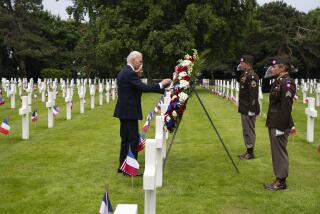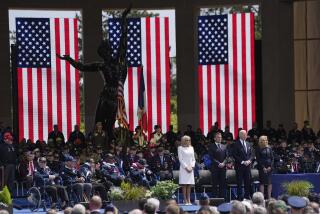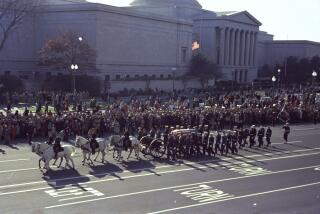Memorial Day, for a father whose son was killed in Iraq
- Share via
Where I grew up in the Midwest during the 1950s and early ‘60s, Memorial Day was no more about remembering the nation’s war dead than Labor Day was about honoring working stiffs. It was a “free day.” Falling on a Monday, Memorial Day made possible that great innovation, “the long weekend.” As a family, we gathered in backyards for barbecues and to celebrate the informal beginning of summer. We did not gather in cemeteries to pay homage.
During my years as a serving soldier, Memorial Day connoted something quite different: It meant no scheduled training. It no longer implied a “free day,” however. In the outfits where I served, holidays were the days we officers wore civvies to work, trying to catch up on everything left undone (usually paperwork) during the duty week. In retrospect it seems odd and more than a little embarrassing: Girding ourselves to fight the Red hordes, we Cold Warriors could spare no time to contemplate the sacrifices made by the real warriors who had preceded us.
Three years ago this month, my son was killed while serving in Iraq. His death changed many things, among them my own hitherto casual attitude toward Memorial Day.
Here in New England, where we now make our home, deejays and local news anchors still proclaim Memorial Day weekend the unofficial start of summer, as if unearthing some fresh discovery. Folks with cottages to open up take to the highways, pushing through traffic toward seashore or mountains. Our trek will be considerably shorter and simpler: We will make the five-minute drive to our son’s gravesite.
For us, personal loss has rendered the last Monday in May into the day of remembrance that it was originally intended to be. Yet loss has also invested Memorial Day with political significance, posing uncomfortable questions.
The fallen gave their lives so we might enjoy freedom: However comforting, this commonplace assertion qualifies at best as a half-truth. Who can doubt that the soldier killed in battle at Gettysburg or on Omaha Beach died while advancing the cause of liberty? Whether one can say the same about the Americans who lost their lives assaulting Mexico City in 1847, suppressing Filipino demands for independence after 1898 or chasing rebels in 1920s Nicaragua is less clear, however.
In recent decades especially, the connection between American military intervention and American freedom has become ever more tenuous. Meanwhile, competence has proved notably hard to come by. Rather than being a one-off event, Vietnam inaugurated an era in which the United States has routinely misunderstood and repeatedly misused military power. Even as political authorities sent U. S. forces into action with ever greater frequency, decisive results — what we used to call victory — became more elusive. From Beirut and Bosnia to Iraq and Somalia, the troops served and sacrificed while expending huge sums of taxpayer money. How their exertions were helping to keep Americans free became increasingly difficult to discern.
The ongoing conflict in Afghanistan, already the longest shooting war in U.S. history, embodies these trends. Just about no one, from the senior field commander on down, considers the war there winnable in any meaningful sense. Arguments for perpetuating the U.S. military commitment resemble those once offered to justify Vietnam: We can’t afford to look weak; American credibility is on the line.
How exactly did we get ourselves in such a fix, engaged in never-ending wars that we cannot win and cannot afford? Is the ineptitude of our generals the problem? Or is it the folly of our elected rulers? Or could it perhaps be our own lazy inattention? Rather than contemplating the reality of what American wars, past or present, have wrought, we choose to look away, preferring the beach, the ballgame and the prospect of another summer.
So while politicians promise peace and Congress ponies up the money for war, the troops head back for yet another combat tour. And more American families will be given the opportunity to experience Memorial Day in ways they never expected.
Andrew J. Bacevich is a professor of history and international relations at Boston University. His new book, “Washington Rules: America’s Path to Permanent War,” will be out this summer.
More to Read
Sign up for Essential California
The most important California stories and recommendations in your inbox every morning.
You may occasionally receive promotional content from the Los Angeles Times.










